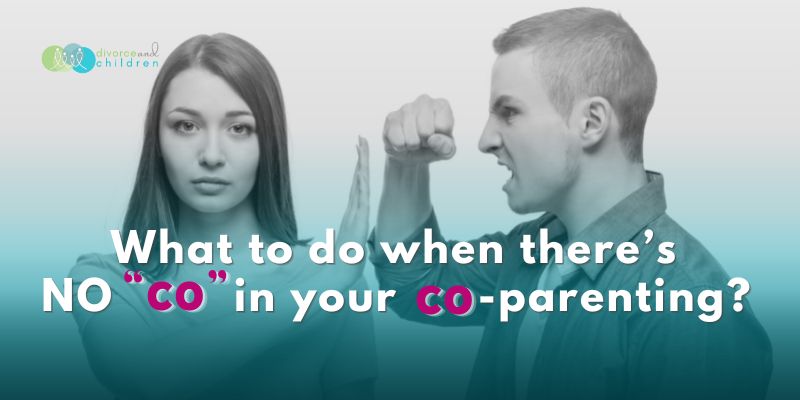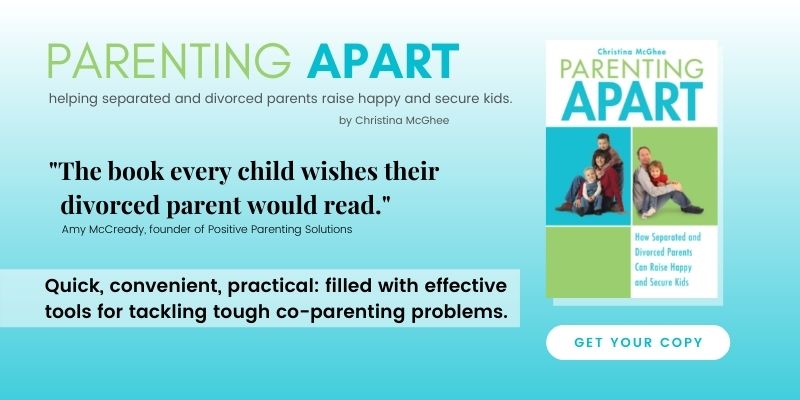How to Co-Parent With A Conflictual Parent

When you have to co-parent with someone who is dedicated to conflict, you can expect that just about everything related to co-parenting will be more difficult after your divorce.
I hear it all the time. “Christina, how can I possibly co-parent with someone who isn’t willing to be cooperative or does everything they can to make co-parenting as hard as possible?”
I get it. While many parents get along better after they part, that’s not everyone’s reality.
Which is why I joined my good friend Susan Guthrie, host of the excellent podcast, Divorce and Beyond, to talk about the challenges a lot of parents are dealing with on the daily.
If you’d like to listen to our conversation, click the image below.

The truth is when you have a high-conflict co-parent, you can expect that just about everything related to co-parenting will be more difficult. Daily haggling over issues like scheduling, how much time children spend in each home, what constitutes appropriate parenting, or discipline differences are, without a doubt, some of the heavy hitters.
And then there are parents who have the supreme joy of dealing with a co-parent who is constantly changing things up. One day they’re inviting you to go out to dinner as a family, and the next day is sending you a thousand-word text about how you totally suck as a parent.
While how you and your co-parent relate to each other post-divorce can have a big impact on your children’s adjustment, it’s not the end of the world if you and the other parent don’t see eye-to-eye.
If the other parent’s lack of consistency and cooperation is driving you nuts, here are a couple of tips worth considering.
“Keep in mind that how well kids manage differences and conflict between households is significantly influenced by how
Christina McGhee
well you deal with them.“
Lean into your co-parenting values.
When you have an uncooperative co-parent, it’s easy to fall into the trap of focusing more on trying to fix, control, or change the situation instead of paying attention to what you have control over, yourself.
This vicious cycle happens in lots of different ways…
- Wishing the other parent would listen to reason, come to their senses, and stop fighting.
- Getting angry because things “should be” or “could be” different if only the other parent would put the kids first.
- Feeling trapped, helpless, or hopeless (“Why bother? There’s nothing I can do about any of it because they’ll never agree.”)
- Overanalyzing your co-parenting dynamic by constantly trying to figure out what you can do to fix or change the situation or your co-parent.
Instead of keeping yourself in a reactionary state or overwhelmed by hopelessness, try taking a different approach. The first step involves spending some time identifying your co-parenting values. Once you decide how YOU want to show up for your kids, center your decisions and actions on YOUR values instead of what your co-parent does or doesn’t do.
Stay the course.
Staying the course is a big-picture strategy that has to do with being consistent. Once you get crystal clear about who you are and what kind of parent you want to be for your children, the goal is to respond or act in a predictable manner.
Let’s imagine you have a co-parent whose behavior is consistently inconsistent. One day they call you up and say they want to be flexible around pick-ups and drop-offs. Yet the next day, they’re blocking your number and won’t respond to your text messages about the kids.
Instead of going off the rails and getting angry or blocking them back, you choose a different path. When it comes to being flexible about the schedule, you base your decision on what’s best for your children, not whether or not your co-parent is being nice.
If they choose to block you the next day, you take it in stride because their behavior isn’t a reflection of you. When you stay the course (which btw is much easier said than done), it doesn’t matter that things went sideways because you respond out of your values. You conduct yourself with integrity and keep your kids in the center, not the middle.
Adjust your expectations and accept things as they are FOR NOW.
Co-parenting with someone who is uncooperative or constantly conflictual is mentally and emotionally draining. Unfortunately, parents dealing with this dynamic often find themselves trapped in the disappointment cycle.
Just when they think they’ve turned a corner with their co-parent and things will be different, they become completely discouraged or shocked when their co-parent’s behavior returns to being anything but cooperative.
To avoid jumping back on the disappointment train, I recommend adjusting your expectations, which may involve a little radical acceptance. Simply put, you accept, “It is what it is, whether I like it or not. “
To be clear, accepting that you have a high-conflict co-parent doesn’t mean you can’t hold space for hope. You can always hope that over time, things might change. However, FOR NOW (two essential words to add to your co-parenting vocabulary), you accept that this is what your co-parenting relationship looks like.
Acceptance doesn’t mean rolling over.
To be clear, accepting your situation doesn’t mean you should give your co-parent carte blanche to behave any way they want. You still need to set appropriate limits in your co-parenting relationship and make decisions based on what feels okay for you.
When issues or conflicts come up, carefully weigh your response and the impact it will have on your kids.
Ask yourself:
- What’s really at stake here?
- What are my values around this situation or decision?
- How much will this matter six months from now? What about a year?
- How will my reaction make this situation worse? How might I be able to make it better without compromising my values or boundaries?
Provide kids with an alternate perception of reality.
When a co-parent shares information with children that you don’t agree with or engages in badmouthing, avoid the pitfalls of saying too much or nothing at all.
Setting the record straight or telling kids your side of the story isn’t helpful. AND neither is keeping quiet. The goal is to land somewhere in between.
When your child is sharing information with you, do your best to manage your reaction and listen more than you talk.
You can say things like, “Sounds like Dad is upset with me. Sometimes, when a parent is angry, they may say mean or hurtful things to hurt a person’s feelings. I don’t agree with what Dad said.”
I would also recommend adding to that message by saying something like… “Just because Dad is upset with me doesn’t mean you need to be upset with me. “
Or “That may be the way Mom sees it. However, that’s not the way I see it. I have a different perspective.”
Are you a co-parent who doesn’t have enough “co” in your co-parenting relationship?
Then be sure to check out the Divorce and Beyond Podcast hosted by Susan Guthrie. Susan does an outstanding job of curating a wealth of information focused on helping separated and divorced parents thrive after divorce. Chances are, if you have a question or concern, Susan has already created an episode to address it.






